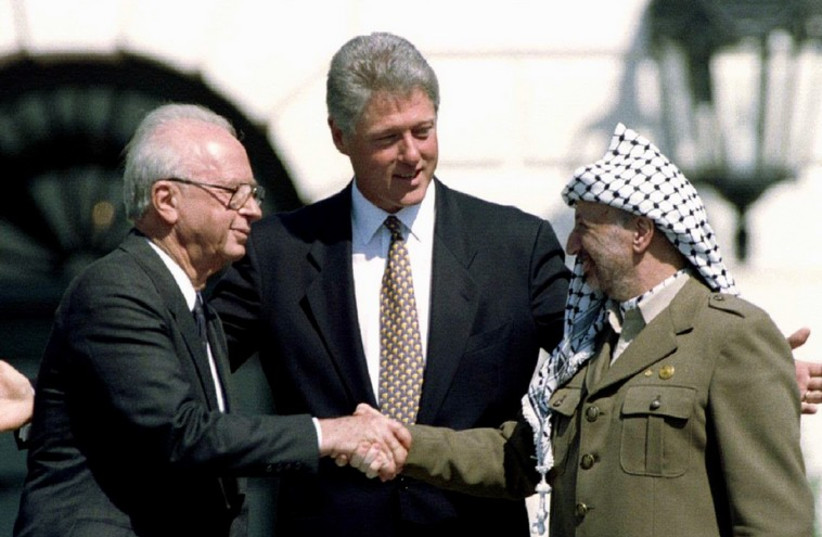CNN's Fareed Zakaria interviewed former Israeli Prime Minister Ehud Olmert and Palestinian politician Nasser al-Qudwa on their shared proposal for a two-state solution, on Sunday.
Ehud Olmert had written up and signed the proposal with Nasser al-Qudwa, nephew of former Palestinian Authority President Yasser Arafat, on July 17, 2024, which provides for the state of Palestine alongside the state of Israel.
At a briefing on Thursday, US National Communications Advisor John Kirby told reporters that ninety percent of the Gaza deal has been completed, despite wide gaps remaining on two key sticking points – the hostage-prisoner swap and the Philadelphi Corridor.
However, Prime Minister Benjamin Netanyahu stated in an interview with Fox News on Thursday: "There's not a deal in the making, unfortunately. It's not close."
In response to the current turmoil in Israel regarding the developments of the hostage deal, Ehud Olmert stated: "I believe that we are close to a turning point. We have to make a deal."

"I completely trust the announcement from the white house that they have an idea for a deal which can work if the Israeli Prime Minister will agree to it," he added.
According to Olmert, Netanyahu has no substantial reason for refusing a deal, adding that former coalition members disagree with the Prime Minister and have said that issues such as the Philadelphi Corridor are not good enough reasons not to go ahead with the deal.
"He simply doesn't want to end the war," Olmert clarified to Zakaria.
"The only way to reach an agreement at the end of the day is to end the war between us and the Palestinians in Gaza and to embark on a different direction that Dr. Nasser al-Qudwa and I have thought, talked, and written about," Olmert continued, referring to their joined proposal.
When questioned why this proposal may have better outcomes when all others have failed, Nasser al-Qudwa explained.
It might work now because of the war because I believe that the people on both sides have become tired of the war, and they want to see an end to the war and a substitute for the war," al-Qudwa noted.
The joint proposal consists of a mutual proposal in terms of ending the war: A ceasefire in Gaza, the release of all Israeli hostages in Gaza and a decided-upon number of Palestinian prisoners in Israel, the full withdrawal of Israeli troops from Gaza, the establishment of a council of commissioners to administer Gaza, which al-Qudwa noted that would be organically linked to the Palestinian Authority, and the return to 1967 borders with 4.4% land exchange, as proposed by Olmert.
"We don't want to create another entity in the West Bank; on the contrary, we want to maintain the territorial integrity and the unity of the Palestinian people," al-Qudwa added.
"There is an alternative to war; we don't need to go along the same path of killing and bloodbaths that we see in Gaza."
No political support for such a proposal
The Israeli Knesset passed a resolution opposing Palestinian statehood, clarifying that there would be no two-state solution in July, with a 68 - 9 vote on the declaration.
“We will not succeed in convincing our friends in the world if we do not speak clearly against the establishment of a Palestinian state, which is a threat to the State of Israel,” New Hope - United Right Party head MK Gideon Sa’ar had stated to the plenum.
Concerning the current lack of support, Olmert noted: "This is the reason this should be on the agenda right now. It's time to change direction. We are going to defeat Hamas; we already have. We may kill a few more, and then there will not be any Hamas left. What then? There are six million Palestinians. I commend dr al-Qudwa for his courage and understanding that this is not the time to avenge each other."
"This is the time to move away from the bleeding of this terrible confrontation that we had into a direction that may offer a new horizon. And that is what we're trying to do. It's highly unpopular maybe now amongst them, and amongst us when it becomes popular, it will be very easy," he added.
"We are fulfilling a mission that will change the Middle East and maybe the world."
